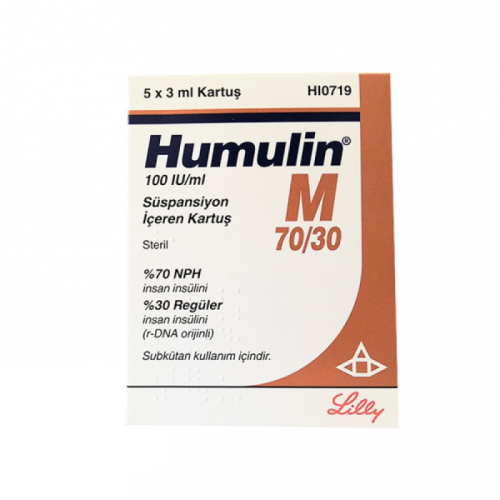Humulin M 70/30 (Cart)
- Brand: Lilly
- Product Code: Humulin M 70/30 (Cart)
- Availability: In Stock
-
$61.00
CLASSIFICATION
Hormone and Synthetic Substitute / Antidiabetic Agent
ACNE
No
WATER RETENTION
No
HBR
No
HEPATOTOXICITY
No
AROMATIZATION
No
MANUFACTURER
Lilly
WAREHOUSE
International Warehouse 2
SUBSTANCE
Insulin
,
Insulin Isophane
,
Insulin is a potent anabolic hormone produced by all humans and is crucial for maintaining proper bodily function. While it is naturally generated by the body, individuals with diabetes often require exogenous insulin. Some athletes also use it to enhance muscle growth. However, using insulin without appropriate medical supervision can be extremely dangerous and should be approached with great caution.
Although insulin production occurs naturally in humans, exogenous insulin was first introduced in the 1920s, initially extracted from the pancreases of dogs, followed by cattle and pigs. Despite concerns regarding purity, the use of animal-derived insulin was highly regarded as it saved countless lives. Without insulin treatment, diabetes can often lead to fatal consequences. By the 1970s, purity issues improved significantly, and in 1975, Ciba launched the first synthetic insulin. This was further refined in 1982 with the release of Humulin-R, an accurate replica of human insulin that received FDA approval.
Functions & Characteristics of Insulin:Insulin is secreted by the pancreas and classified as a peptide hormone. Its primary role involves regulating the use of glucose, amino acids, and fatty acids in the body, as well as preventing the breakdown of glycogen, fat, and protein.
Diabetes necessitates insulin for two main types: Type I diabetes patients do not produce sufficient insulin naturally, while Type II patients do produce insulin, but their bodies fail to recognize it effectively at the cellular level; Type II diabetes is commonly associated with obesity.
As a peptide hormone, insulin promotes glycogen conversion into glucose in the liver and inhibits the production of glucose from non-carbohydrates. Insulin also facilitates glucose uptake into cells, promoting muscle growth and enhancing protein synthesis. Additionally, high insulin levels have been linked to increased bone density and boosted production of Insulin-Like Growth Factor-1 (IGF-1), another anabolic hormone.
Beyond these functions, insulin has been shown to elevate Luteinizing Hormone (LH) and Follicle Stimulating Hormone (FSH) levels, which could potentially enhance testosterone production in the body, although the effect is relatively minor.
Effects of Insulin:The regulation of blood sugar is the primary effect of insulin in individuals with diabetes. Its potent anabolic and anti-catabolic properties can also benefit various athletes. However, using exogenous insulin without diabetes can lead to significant fat gain and even be lethal if not used correctly.
For athletes, high insulin levels can hinder the body’s ability to burn stored fat, necessitating a carefully planned diet to ensure that glucose and protein are utilized by muscle tissue rather than stored as fat. Administering insulin immediately following intense workouts alongside proper nutritional intake is crucial.
Insulin can facilitate substantial lean muscle development in a short time, although many struggle to manage potential fat gain. The combination of anabolic steroids and insulin along with Human Growth Hormone (HGH) is often recommended in performance contexts to enhance growth and aid in fat control.
Side Effects of Insulin:One main concern regarding insulin use is hypoglycemia, which can be serious in performance settings. Proper dosing typically mitigates this risk for diabetics, but athletes may face severe consequences if they misuse insulin.
Hypoglycemia occurs when blood glucose levels drop too low and is characterized by various symptoms, including dizziness, hunger, sweating, and confusion. If such symptoms arise, individuals should quickly consume fast-acting carbohydrates such as candy or sugary drinks. It is advisable not to sleep shortly after taking insulin due to the risk of experiencing hypoglycemia during sleep, which can be fatal if untreated. Therefore, it is crucial to have someone present during insulin use to provide assistance if needed.
Severe hypoglycemia can lead to diabetic comas, and while it can usually be corrected, the potential for death makes it a serious concern. Allergic reactions, though rare, can manifest as swelling or irritation at injection sites, requiring immediate medical attention if they occur. Repeated injections in the same area may lead to localized fat accumulation, highlighting the importance of rotating injection sites.
Insulin Administration:Insulin dosing for diabetes varies widely based on individual needs. Similarly, for performance enhancement, multiple insulin forms are available, with short-acting varieties like Humulin-R, Humalog, and Novolog being more appropriate for athletes.
Humalog takes effect within about 15 minutes of injection, peaking between 30-90 minutes, while its effect lasts 3-5 hours. Novolog and Humulin-R have similar time frames, but both are slightly slower than Humalog. While Humulin-R can be purchased over the counter, Humalog requires a prescription.
A common starting dose for performance enhancement is 1 unit per 10 pounds of body weight, but novices should begin with a lower dose and gradually increase it, monitoring for hypoglycemia symptoms along the way.
The optimal time for administration is directly after weight training, accompanied by a meal containing a minimum of 100 grams of carbohydrates and 40-50 grams of protein. Adequate fast-acting carbohydrates should always be on hand in case hypoglycemic symptoms occur.
Conclusion:Insulin is crucial for health and the body's functioning. It can significantly aid muscle development in a performance context but carries substantial risks. Many men may not benefit from its use and could achieve better body composition by avoiding it. Nevertheless, it is popular in competitive bodybuilding, where athletes often use it alongside other steroids and hormones. It's important to consider personal goals and the potential risks before using insulin as a performance enhancer.

